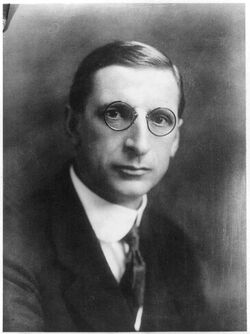
Éamon de Valera (14
October 1882–29 August 1963) was the 32nd President of the United States of America from 1933 to 1941. Born in New York City to an Irish-Catholic family living in squalor, he was brought back to Ireland at the age of two to be raised by his grandmother. He returned to America in 1912 to seek work in the city of his birth.
Appalled by the treatment of his fellow Irish-Americans living in New York, he successfully ran for Congress as a Democratic Candidate in 1916. He was elected a Senator in 1922. Following a heated Presidential Primary against fellow New Yorker Franklin D. Roosevelt, de Valera won the Democratic Nomination for President and after beating incumbent Herbert Hoover, became President of the United States in 1933.
His Presidency was know for its breakaway from American Isolationism. In what was dubbed the "Dev Deal" (a response to his Democratic opponents New Deal) de Valera instituted not only a variety of programs designed to produce relief (government jobs for the unemployed), recovery (economic growth), and reform (through regulation of Wall Street, banks and transportation), but also numerous government grants to the agricultural and manufacturing industries. This was an attempt to great a self-sustaining and economically viable America.
He emphasized traditional American values and encouraged small business enterprises with tax reliefs for job creators. He also increased the size of the army considerably, citing it not only as a mechanism to create jobs but that a strong nation was judged not only by its wealth but also its strength. The Dev Deal proved to be a staggering success. By the time his second term began in 1937 it had created a self-sustaining and powerful America, both economically and militarily. However this increased the popularity of America's isolationism, something he did not intend.The Second Dev Deal proposed to create ties, both trade-wise and politically, with Europe and Asia. This policy proved incredibly unpopular with the American people, especially when it was revealed that a large proportion of the budget would go towards investing in developing countries such as China and Ireland as well as the struggling economies of Britain and France. De Valera insisted that America would reap what it had sown in the future, yet the voters remained skeptical.
De Valera left office in 1941 with one of the lowest approval ratings of an exiting President at 12%. Although he secretly had hoped to run for a third term to ensure his Deals remained in place, opinion polls convinced him otherwise. He was replaced by Republican Robert Taft, an isolationist, whose first act as President was to reverse the Second Dev Deal.
However, de Valera was ultimately proven right. The investments of the Second Dev Deal were clearly visible. The American aid sent to China during the Japanese invasion allowed the Chinese army, led by Chiang Kai-shek, to resist the invasion and lead to a total Japanese withdrawal by August 1945. Japan's pre-occupation with China led to the cancellation of plans to invade the Dutch East Indies and the Philippines. In Europe, Britain and France, strengthened by American investment, successfully repelled the repeated German invasions of France between 1940 and 1943. Following an uneasy alliance with Russia, the Allies invaded Germany in June 1944, capturing Berlin and Hitler by September.
Praised in Europe and China as an internationalist and great investor of other nations, he was criticised in America for the same reasons. De Valera went into exile in Ireland where he remained for the rest of his life in retirement. Subsequent revisions of his Presidency in the 1950s however gave him a resurgence in popularity to both him and his policies. In 1960, John F. Kennedy, an Irish-American opponent of isolationism, was elected President with de Valera's son, Vivion de Valera, as his Vice-President. Although invitations were made to de Valera to return to America, he refused them citing his poor health and old age. De Valera would eventually meet Kennedy during his state visit to Ireland in June 1963. A few months later, on the 29th of August 1963, Éamon de Valera died of heart attack aged 80. A few months later in November, following the assassination of President Kennedy by Lee Harvey Oswald, an extreme-isolationist, Vivion de Valera became the 37th President of the United States of America.
